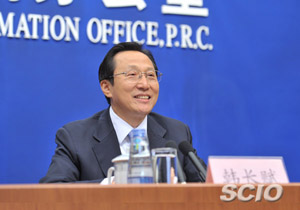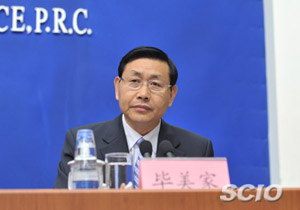Han Changfu, Minister of Agriculture of China, briefed about latest developments in agricultural and rural development at the Press Conference hosted by the State Council Information Office on Dec. 6th, 2013. At the Press Conference, Minister Han and MOA spokesman Bi Meijia jointly took following questions:
Feeding the people on our own
CCTV: Despite of lower temperature and water-logging in Northeast China in spring, prolonged heat wave in South China and heavy floods in Northeast China in summer, China registered the tenth consecutive year of grain output growth this year. What help make it? Then, why did grain imports increase markedly from some Southeast Asian Countries?

Minister Han: China's grain output is expected to reach 600 million tons for 2013, a record high and the 10th bumper harvest year in a row. The output of cotton, edible oil, sugar, meat, egg, milk, fruits, vegetables, fishery and other major agro-products maintained steady increase, ensuring abundant supply and stable prices in the market
To ensure grain output growth, MOA took several pro-farm policies and measures. In general, three factors contributed to this hard-won achievement, namely incentives for farmers, prevention and mitigation measures against natural disasters and agro-technology extension services.
It's true that our grain imports did rise in the past few years. The root cause of increasing imports is that the grain output growth can not keep up with the growth of demand, resulted from population growth, accelerated urbanization and changes in people’s diet.
Trade happens when imports offer more options and lower prices to consumers. Taking wheat import for example, China has sufficient supply of wheat, yet we import top-grade flour for bread making. Lower prices in international markets also spurred procurements.
Being both a big producer and consumer of food, China has always counted on itself for its food security, and maintained a self-sufficiency rate of 95 percent. Despite rising imports, China is committed to feeding its people on its own, though it will also take advantage of the global market.
Boosting farmers’ income
China Daily: It was decided at the 18th CPC National Congress that China will double its 2010 per capita income for both urban and rural residents by 2020. Then, what is the concrete plan to double farmers’ income?
Minister Han: Farmers’ income increase is one of the priorities for our agricultural and rural work. In the previous three quarters of this year, farmers’ per-capita income in cash reached 7,627 yuan, up by 9.6% than that of last year. It is estimated that the figure will keep on increasing throughout the year, and the growth rate will surpass that of urban residents for four years in a row.
Generally, farmers’ income has four components, namely income from agricultural activities, wages, transfer payment, and property income. The Government is creating a better environment for farmers’ income increase. Efforts will be made to encourage agricultural sectors of comparative advantages, which would increase farmers’ household income from agricultural activities. Wages will continue to take a big share in farmers’ household income when migrant workers are of wider choices and better payment. The Government will improve its pro-farm policies, including subsidies and compensation policies to farmers. Such preferential policies would increase the transfer payment to farmers. The just-convened 3rd Plenary Session urged the reform in rural property right system and give better protection to farmers’ property, which would generate greater property income to farmers.
I am confident that given the promising agricultural and rural development, farmers will double their income by the end of 2020.
Clarifying rural land reform policies
China News Service: My question is about rural reform, one of the focuses of the Decision adopted by recent-convened the 3rd Plenary Session of the 18th CPC Central Committee. What are the breakthroughs in rural land reform policies? There are several interpretations of the policies. What do you think?
Minister Han: What you asked is a hot topic and an issue of common concern. Rural land tenure system is the fundamental system in China’s rural areas. Rural land is a form of significant property for farmers and is usually under collective ownership.
Land ownership, land contract right and right to use are three different concepts.
We should understand the land reform package outlined by the Decision in a comprehensive manner. There are a few misunderstandings on the trading of some rural construction land. For example, some claimed that the market will be open to all rural land.
Some of those interpretations are incomplete as there are certain restrictions to the policy. The construction land qualified for trade does not include that designated for housing, farming and infrastructure purposes, and it will also be subject to certain planning and use restrictions.
Two things need to be clarified. First, rural land reform policy is intended to increase farmers' property earnings, not to increase land supplies for urban construction, nor to draw urban residents or commercial capital to the countryside to buy land. On the precondition that the scale of farmland is guaranteed, farmers will be allowed to transfer and mortgage their land-use rights, or turn the rights into shares in large-scale farming entities.
Second, China will take an active yet prudent approach to promote the reform. We should not blindly rush into action before a clear understanding of the situation.
Reviewing GM corn application
Reuters: GMO corn has been approved by many countries, even by EU members for imports. Why does China delay the approval ?

Bi Meijia: MOA did reject several applications for GMO imports for the reason of incomplete application dossier.
In March 2010, Syngenta AG submitted an application to sell GM corn MIR162 and carry out environmental safety and food safety tests in China, before it went on to apply for a safety certificate for the GM corn as a raw material for processing.
Although the company applied multiple times, it failed to provide complete application dossier and experimental data. MOA asked the company to submit supplementary material.
Syngenta AG applied again in November this year and the new application is under review.
Source in Chinese: The State Council Information Office website
(All information published in this website is authentic in Chinese. The English version is provided for reference only.)